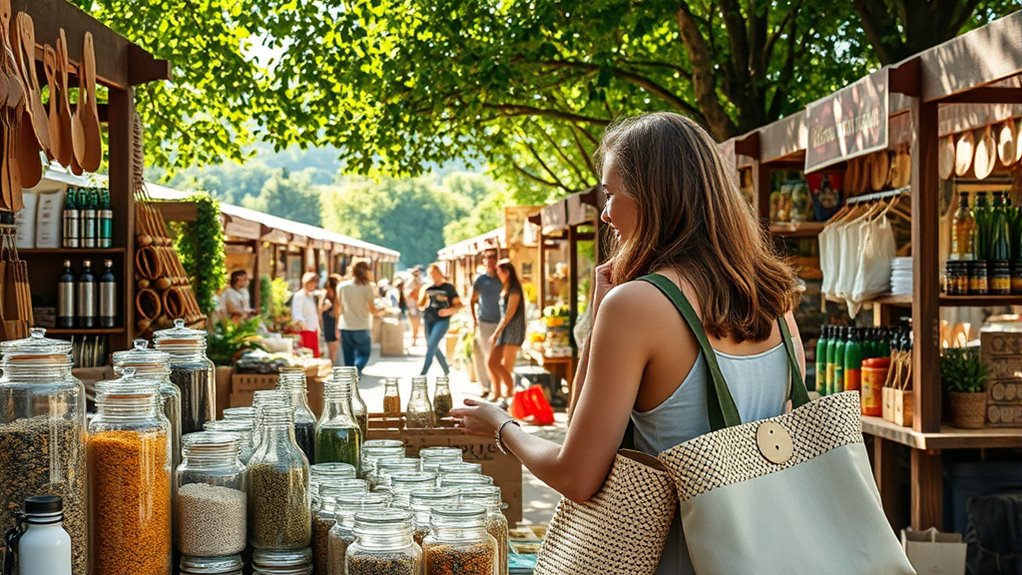To travel plastic-free, start by packing eco-friendly essentials like reusable bottles, utensils, and containers, and organize your travel documents digitally. Choose sustainable accommodations and shop with reusable bags and minimal packaging. Focus on local markets for food and bring your own containers. Stay mindful during your trip, politely decline plastic items, and support eco-conscious businesses. If you want to discover detailed steps and tips, explore how to make your journey as eco-friendly as possible.
Key Takeaways
- Plan and pack an eco-friendly travel kit with reusable essentials, documents, and wellbeing items.
- Choose durable, portable reusable materials like stainless steel, bamboo, and silicone for meals and storage.
- Shop with reusable bags, buy in bulk, and select products with minimal or compostable packaging.
- Book eco-friendly accommodations and carry snacks and drinks in reusable containers to avoid single-use plastics.
- Maintain sustainable habits by carrying reusable items, declining plastic items, and practicing mindfulness during travel.
Planning Your Eco-Friendly Travel Kit
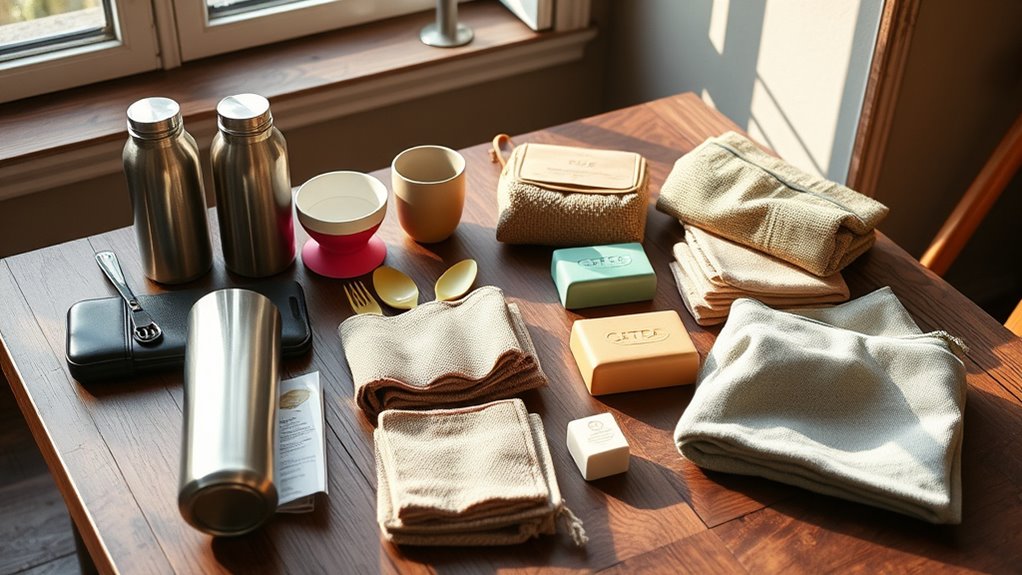
When preparing for an eco-friendly trip, planning your travel kit carefully can make all the difference. Start by guaranteeing you have all necessary travel documentation, like passports, visas, and copies of reservations, stored in a reusable folder. This keeps you organized and reduces paper waste. Don’t forget to include travel insurance details, so you’re prepared for emergencies without relying on single-use paper policies. Consider packing digital copies of important documents on a secure device. Additionally, bring eco-friendly essentials like reusable water bottles, utensils, and a compact first aid kit. Carefully selecting these items helps you stay prepared while minimizing plastic waste. For maintaining your health during travel, consider including essential oils such as lavender or peppermint to help with issues like stress or nausea. A well-thought-out travel kit ensures a smoother journey and aligns with your eco-conscious goals from the start.
Choosing Reusable Containers and Utensils

When choosing reusable containers and utensils, consider the materials like stainless steel, glass, or bamboo for durability and safety. Think about their size and portability so they fit easily into your travel bag without adding bulk. Look for eco-friendly features like leak-proof lids or collapsible designs that make packing more convenient and sustainable. Additionally, ensure that the containers are made from safe and non-toxic materials, which is especially important when storing food or beverages during travel.
Material Options Available
Opting for reusable containers and utensils is a practical way to reduce plastic waste while on the go. When choosing materials, consider options like biodegradable cutlery, which break down naturally and lessen environmental impact. Silicone storage options are versatile, durable, and easy to clean, making them perfect for travel. Here are four material options to contemplate:
- Bamboo – lightweight, natural, and biodegradable, ideal for utensils.
- Stainless Steel – sturdy, long-lasting, and free from chemicals.
- Silicone – flexible, heat-resistant, and perfect for storage and lids.
- Biodegradable Cutlery – compostable and eco-friendly, reducing landfill waste.
Selecting these options supports your commitment to a plastic-free journey and promotes sustainable habits. Additionally, understanding eco-friendly materials can help you make more informed choices that benefit the environment.
Size and Portability
Choosing the right size and portability for your reusable containers and utensils is essential to making sustainable travel easy and convenient. Opt for items with a compact design that fit comfortably in your bag or pocket, reducing bulk and clutter. Lightweight materials help you carry everything without adding unnecessary weight, making it easier to stay mobile. Consider the types of food you’ll bring and select appropriately sized containers—smaller for snacks, larger for meals. Foldable or stackable utensils save space and are simple to pack. Avoid bulky or overly heavy options that may hinder your movement or become a burden during long journeys. Prioritizing size and portability guarantees your eco-friendly kit is practical, accessible, and ready to use whenever you need it.
Eco-Friendly Design Features
Selecting eco-friendly design features for your reusable containers and utensils guarantees your travel kit is both sustainable and functional. Choosing the right items makes a powerful impact on reducing waste and protecting the environment. Here are four essential features to look for:
- Durable, stainless steel reusable water bottles that keep drinks cold or hot all day.
- Compact, lightweight utensils made from bamboo or stainless steel for easy packing.
- Containers with tight seals to prevent spills and keep food fresh.
- Eco-friendly travel gear designed to withstand daily use and last for years. Color accuracy and contrast ratio are important factors in selecting high-quality home cinema projectors, ensuring vibrant, clear images during your viewing experience.
Shopping Smart: Avoiding Single-Use Items
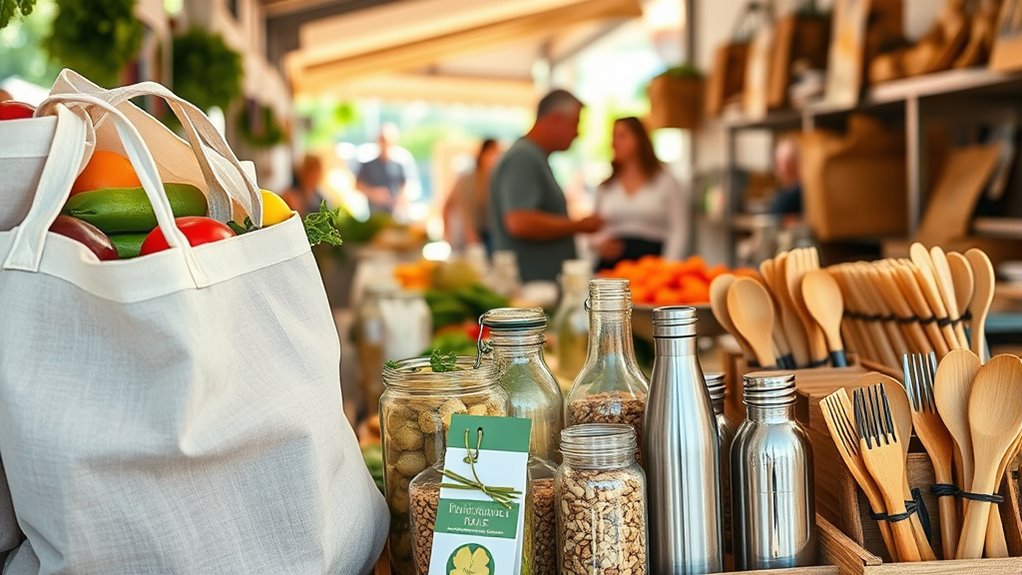
When shopping while traveling, bring your own reusable bags to cut down on plastic. Opt for bulk purchases and choose products with eco-friendly packaging to reduce waste. Small changes like these make a big difference in avoiding single-use items. Additionally, practicing mindful consumption by selecting items that align with your values can help promote sustainable habits.
Choose Reusable Bags
Opting for reusable bags instead of single-use plastic ones is one of the simplest ways to reduce waste while shopping. Choosing the right reusable bag types can make a big difference in your eco-impact. Consider bag size considerations to guarantee they fit your needs—small for snacks, large for groceries, sturdy for heavier items. Here are four tips to help you select the best reusable bags: 1. Pick lightweight, foldable options for convenience. 2. Choose durable materials like cloth or recycled fabric. 3. Match bag size to your typical shopping list. 4. Use different bags for produce, dry goods, and liquids. Incorporating sustainable practices into your shopping routine can further enhance your positive environmental impact.
Opt for Bulk Purchases
By choosing to buy in bulk, you can considerably reduce the amount of single-use packaging that ends up in landfills. This simple change minimizes waste and saves money. Bring your reusable shopping bags to carry bulk items and avoid plastic bags. Look for stores that offer eco-friendly packaging options or encourage customers to use their own containers. Additionally, selecting sulfate-free shampoos can help maintain hair health and color vibrancy, especially for highlighted hair.
| Tip | Benefit |
|---|---|
| Use reusable containers | Cuts down on disposable packaging |
| Shop at bulk stores | Reduces waste and packaging waste |
Opting for bulk purchases not only helps the environment but also encourages mindful shopping habits. By making these small adjustments, you’ll travel lighter and leave a smaller plastic footprint.
Select Eco-Friendly Packaging
Choosing eco-friendly packaging options amplifies your efforts to reduce plastic waste while shopping. By selecting products made from biodegradable packaging or compostable materials, you make a meaningful impact. Here are four ways to shop smarter:
- Opt for products wrapped in biodegradable packaging that break down naturally, minimizing landfill waste.
- Choose items in compostable containers, turning waste into nutrient-rich compost instead of pollution.
- Bring your own reusable bags and containers to avoid single-use plastics altogether.
- Support brands committed to eco-friendly packaging, encouraging industry-wide change.
- Incorporate knowledge of sustainable materials, such as rendered lard or biodegradable options, to make informed choices that benefit the environment.
Every choice matters when it comes to avoiding single-use items. By prioritizing biodegradable packaging and compostable materials, you contribute to a cleaner planet and a more sustainable future.
Staying at Sustainable Accommodations
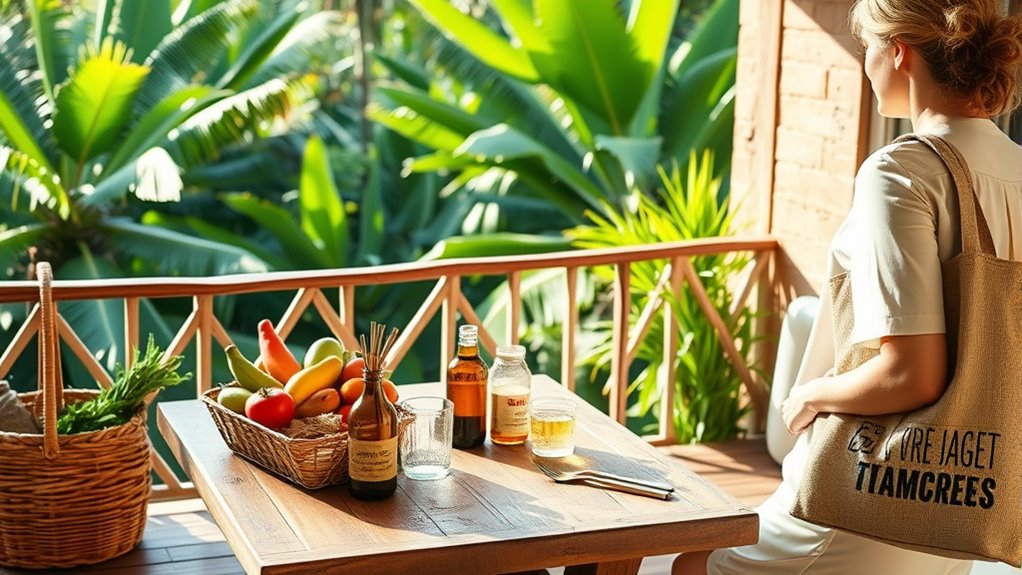
Staying at sustainable accommodations is one of the most effective ways to reduce your plastic footprint while traveling. Seek out local eco lodges committed to eco friendly amenities, which prioritize waste reduction and sustainable practices. These lodges often feature reusable toiletries, solar power, and composting systems, minimizing plastic waste. By choosing eco-conscious stays, you support environmentally responsible businesses and reduce reliance on single-use plastics. Look for accommodations that openly share their sustainability efforts and certifications. Staying in eco lodges not only offers a more authentic experience but also aligns with your goal of traveling plastic-free. Making mindful choices about where you stay can considerably lower your plastic impact and encourage sustainable tourism practices in the destinations you visit. Incorporating yoga practices into your travel routine can also promote mindfulness and stress relief during your journey.
Navigating Food and Beverage Options Plastic-Free
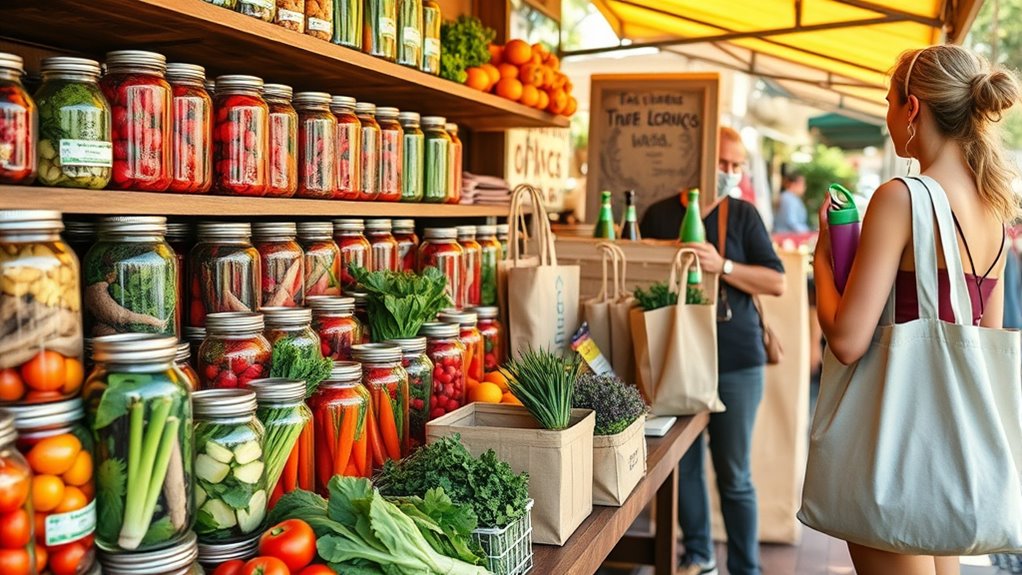
Exploring food and beverage options plastic-free requires mindful planning and awareness of your surroundings. To make this easier, consider these tips:
- Pack your own travel snacks in reusable containers to avoid single-use plastic wrappers.
- Bring a durable, eco-friendly beverage container to stay hydrated without waste.
- Look for local markets or zero-waste stores to buy fresh produce and snacks.
- Ask vendors if they offer plastic-free packaging—many are happy to accommodate.
- Opt for accommodations that embrace rustic decor and eco-friendly practices to enhance your sustainable travel experience.
Tips for Maintaining Your Plastic-Free Lifestyle While Traveling
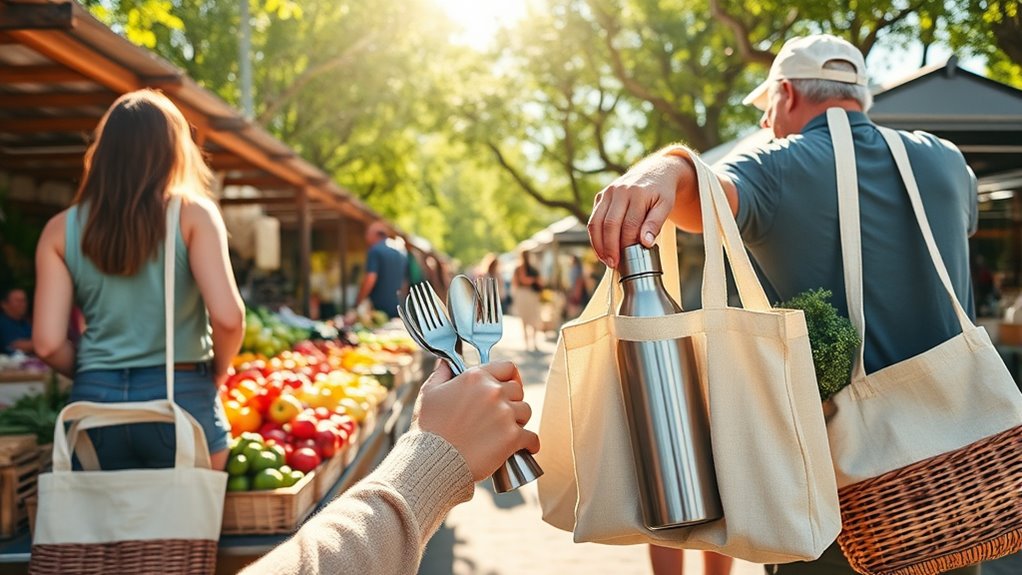
Maintaining your plastic-free habits while traveling can be challenging, but with some proactive strategies, it’s entirely manageable. Start by carrying reusable items like a water bottle, utensils, and shopping bags to reduce reliance on single-use plastics. When exploring local cuisine, seek out vendors who use minimal packaging or offer reusable containers. Engaging in cultural experiences often means trying traditional foods, so ask about eco-friendly options or bring your own reusable supplies. Research ahead of time to find markets or restaurants that support sustainable practices. Be polite but firm when declining plastic utensils, straws, or bags. Staying mindful and prepared helps you enjoy authentic cultural experiences without compromising your commitment to a plastic-free lifestyle.
Frequently Asked Questions
How Do I Handle Unexpected Plastic Waste Emergencies During Travel?
When you face unexpected plastic waste emergencies during travel, stay calm and rely on your emergency preparedness. Carry reusable bags and containers to manage waste on the spot, and look for eco-friendly waste disposal options nearby. If necessary, seek out local recycling facilities or waste management services. Staying prepared helps you handle these situations responsibly, reducing plastic pollution and maintaining your commitment to a plastic-free journey.
Are There Specific Travel Insurance Policies for Eco-Friendly Travelers?
You might find eco-friendly insurance with green travel coverage that suits your needs. These policies often include eco-friendly benefits, like supporting sustainable projects or covering environmental emergencies. When searching, look for travel insurance providers that offer eco-friendly insurance options, ensuring your trip aligns with your values. By choosing green travel coverage, you protect both your journey and the planet, making your travel experience more responsible and sustainable.
How Can I Find Local Markets Selling Plastic-Free Products Abroad?
Looking for local markets selling plastic-free products abroad? Use local market tips like asking locals for recommendations or exploring markets known for eco-friendly goods. Research online ahead of time to find markets that focus on sustainable and zero-waste products. When browsing, look for vendors offering reusable, biodegradable, or locally made items. These eco-friendly product tips help you support sustainable shopping while reducing plastic waste during your trip.
What Are the Best Apps to Locate Sustainable Travel Resources?
You might think finding eco-friendly travel resources is tough, but apps like Eco Traveller, Green Hotels, and Leave No Trace are game changers. They help you discover recycling initiatives, sustainable activities, and eco-friendly accommodations, making your trip greener. These apps often feature reviews and tips from fellow travelers, ensuring you make responsible choices. Embrace technology to reduce your footprint and prove that sustainable travel is both achievable and rewarding.
How Do I Deal With Language Barriers When Requesting Plastic-Free Options?
When facing language barriers when requesting plastic-free options, you can prepare by learning key phrases related to sustainability in the local language. Use translation apps to overcome translation challenges, but be mindful of cultural sensitivities to avoid misunderstandings. Keep your requests polite and clear, and consider carrying visual aids like images or cards that explain your needs. This approach shows respect and helps you communicate effectively, ensuring your eco-friendly intentions are understood.
Conclusion
By following these tips, you’re well on your way to traveling plastic-free and making a real difference. Remember, every small step counts, and it’s all about staying committed to your eco-friendly journey. Don’t let perfect be the enemy of good—sometimes, you just have to roll with the punches. Keep your goals in sight, and soon you’ll see that sustainable travel becomes second nature. Safe travels and happy eco-adventuring!

